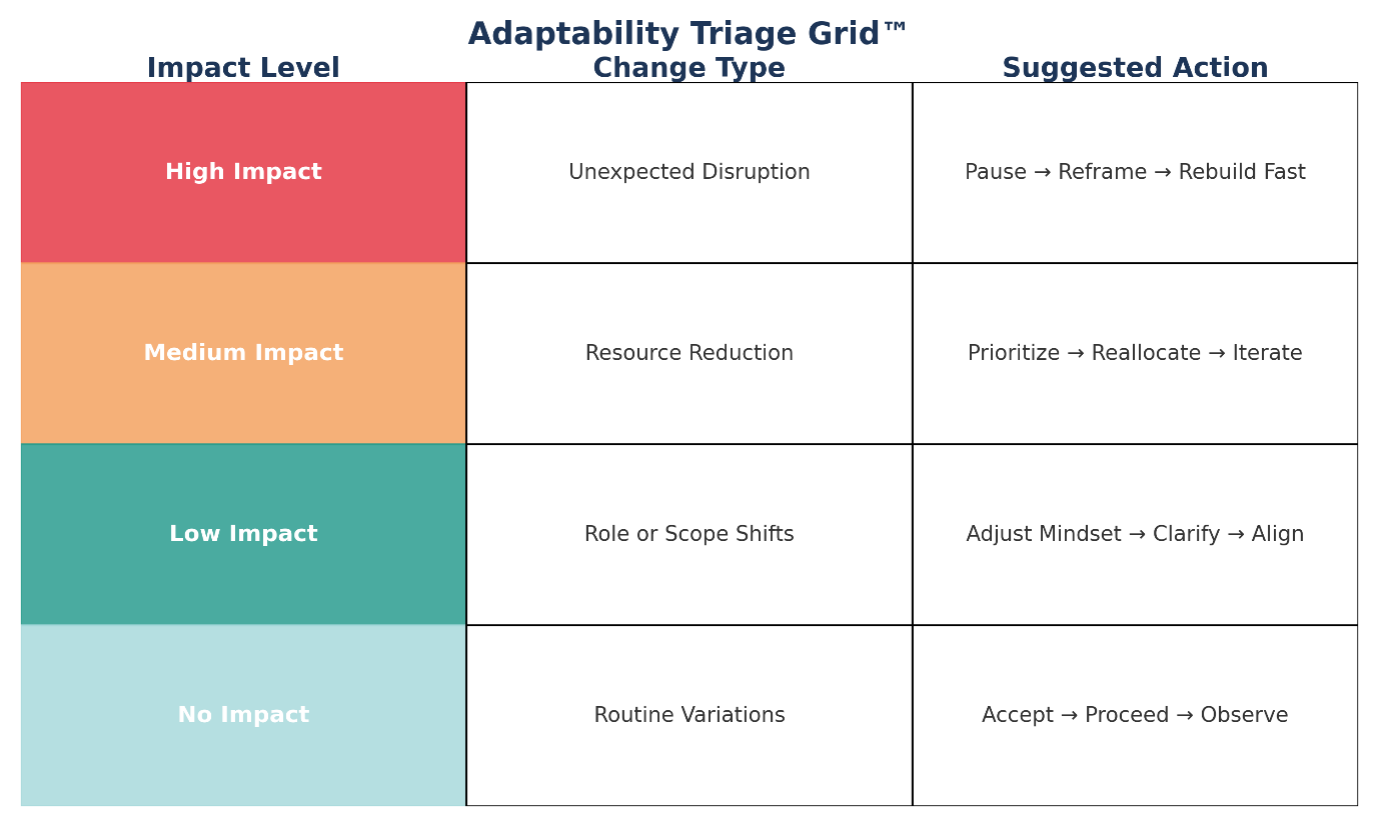
When the Plan Collapsed: A Case in Resilience and Adaptability
The Story
It was 6:15 AM in Dubai. The light from the skyline hadn’t broken yet, but inside the Noralux office, the smell of burnt espresso and stale air hinted at a long night. Raya Sayegh stood alone in front of a whiteboard once filled with Gantt charts, now wiped bare, holding a red marker and facing a more profound dilemma.
The plan—the elegant, investor-approved, step-by-step regional rollout—was now fiction.
Behind her, the office slowly came to life. Ahmed was typing furiously, trying to recover lost configuration files. Lina paced the hallway, phone glued to her ear, chasing a tech vendor that went bankrupt overnight. Tomas sat cross-legged on the floor, staring at cables he no longer trusted.
None of them had slept. And none of them wanted to say what was obvious:
The plan was dead.
But instead of breaking down, Raya took a slow breath. She reached for three poster sticky notes and wrote:
- “What do we control?”
- “What can we build today?”
- “What are we still pretending will work?”
She stuck them near the whiteboard. Then she turned to her team.
“We didn’t lose the project,” she said. “We just lost the map.”
Context / Setup
Noralux, a rising star in consumer tech, was piloting a cloud-based inventory platform across GCC warehouses. Raya, newly appointed Head of Business Integration, was seen as the orchestrator of flawless execution. Her team had mapped the rollout with military precision—until their third-party tech partner dropped out of the equation.
The ERP connector went offline. No backup. No support. And a warehouse go-live deadline is looming over their heads.
The Challenge
The first reaction was silence. Then denial. Then panic.
“I’m sure the vendor will bounce back,” Tomas kept insisting.
But Raya didn’t wait for certainty. She called for a reset—not of the project, but of the team’s thinking.
The Turning Point
Instead of diving into status reports or risk matrices, Raya invited the team into her office, gave each person a blank sheet, and asked a question:
“If we had to deliver something in Bahrain within 10 days—with only the tools we control—what would that look like?”
What followed wasn’t brainstorming. It was a process of grieving, innovating, and then rebuilding.
Lina found a workaround using no-code tools. Ahmed proposed a temporary bridge using the old inventory system. Tomas, previously hesitant, stepped in with a new sequence for manual overrides.
Together, they built a scrappy but real version of the platform. Bahrain launched 17 days later, not with perfection, but with power.
The Response
Raya’s leadership wasn’t in fixing the system—it was in resetting the mindset.
She instituted daily 15-minute “resilience huddles” where team members were encouraged to share one thing that changed and one decision they made. She redefined agility not as fast reaction, but as calm redirection.
Headquarters noticed. More importantly, her team grew stronger, more honest, and braver.
The Lesson
Resilience doesn’t mean pushing harder. It means letting go sooner of expectations, of old assumptions, of plans that no longer serve.
Adaptability is the art of working with what remains and building something better from the pieces that are left.
Practical Tips: Leading with Resilience and Adaptability
- Don’t be overly attached to the plan. Adaptability starts where rigid planning ends.
- Shift the frame. Ask, “What’s possible now?” not “What was supposed to happen?”
- Create safe spaces to fail fast. The sooner a bad idea is tested, the quicker it evolves.
- Shorten feedback loops. Daily insights beat monthly reviews in changing contexts.
- Talk about the loss. Teams can’t move forward if they’re still holding on.
Reflection Prompt
What part of your current plan are you holding onto that might already be obsolete?
Learning Tool: Adaptability Triage GridTM
Below is the visual framework Raya used post-crisis to help teams reframe the types of change and how to respond with clarity, not confusion:
Use this tool with your team when disruption hits. Categorize what kind of change you're dealing with and what response it demands.

Conclusion
"Resilience is not about returning to what was, but moving forward with what is. In the face of change, those who adapt lead. Plans may bend, but purpose holds."
— Raya Sayegh’s Principle of Calm Redirection
Related Blogs

When Logic Wasn’t Enough: Emotional Intelligence in Action
The Scene: It was a bright Thursday afternoon at Meridian Financial, and Layla felt optimistic. Her recent proposal had earned the firm a lucrative client, and today’s meeting was meant to outline next s...

When the Room Went Quiet
Nadine adjusted the sleeves of her blazer and glanced at the clock—9:01 AM. Her team trickled into the meeting room, coffee in hand, chatter softening as they took their seats. Today was her first big meeting as ...

Transform Your Organization with Adaptive Leadership
In today's fast-paced business environment, leaders need more than traditional management skills. Adaptive Leadership is emerging as a powerful approach to navigate complex challenges, foster innovation, and ...

The Evolving Role of Managers in a Changing Business Landscape
The New Face of Management The traditional role of managers is undergoing a profound transformation. In today’s fast-paced, technology-driven world, managers are no longer just task supervisors—they are stra...
